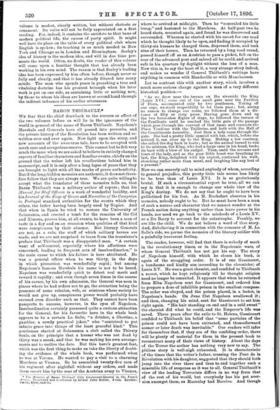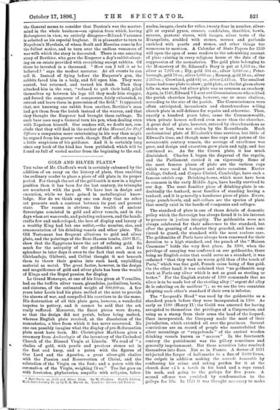BARON THI E BAULT.*
Wu fear that the chief drawback to the success or effect of the two volumes before us will lie in the ignorance of the world in general of the name of Baron Thiebault. Napoleon's Marshals and Generals have all passed into proverbs, and the private history of the Revolution has been written and re- written over and over again. New light upon the story, and new accounts of the ower-true tale, have to be accepted with much care and scrupulous reserve. This cannot but be felt very much the more when we are asked to believe in entirely changed aspects of familiar characters and familiar events, chiefly on the ground that the writer left his recollections behind him in manuscript, and it is only after a long lapse of years that they are brought to light with all the marks of grave authenticity. But if the long-hidden memoirs are authentic, it does not there- fore follow that they are always true. We are quite willing to accept what the translator of these memoirs tells us, that Baron Thiebault was a military author of repute ; that his Manual for Staff Officers is a work of wonderful lucidity, and his Journal of the Siege of Genoa and Narrative of the Campaign in Portugal standard authorities for the events which they relate, the latter having been largely used by Napier. And that when in Spain he tried to restore the University of Salamanca, and erected a tomb for the remains of the Cid and Ximena, proves him, at all events, to have been a man of taste in a day and on an occasion when qualities of that kind were conspicuous by their absence. But literary Generals are not, as a rule, the stuff of which military heroes are made, and we are not surprised to learn from the translator's preface that Thiebault was a disappointed man. "A certain want of self-control, especially where his affections were concerned, leading to frequent acts of insubordination," is the main cause to which his failure is here attributed. He was a general officer when he was thirty, in the days in which promotion was wonderfully rapid ; but among Napoleon's famous Marshals his name is not to be heard. Napoleon was wonderfully quick to detect real merit and reward it rapidly ; and even though seven times in the course of his career, by his own admission, the General was seen in places where he had orders not to go, the attraction being the presence of some relation, wife, or mistress whose society he would not give up. conspicuous power would probably have excused even disorder such as that. They cannot have been passports to success, however, in the eyes of Napoleon. Insubordination certainly possessed quite a curious attraction for the General, for his favourite hero in the whole book appears to be a certain La Salle, "a drinker, a libertine, a gambler, a rowdy practical joker," who "contrived to put infinite grace into things of the least graceful kind." This gentleman started at Salamanca a club called the Thirsty Souls, on the principle that a hussar who was not dead by thirty was a sneak, and that he was making his own arrange- ments not to outlive the date. But this hero's greatest feat, which was the first thing to make us take the liberty of doubt- ing the evidence of the whole book, was performed when he was at Verona. He wanted to pay a visit to a charming Marchesa at Vicenza. So he assembled twenty-five men of his regiment after nightfall without any orders, and made them escort him by the rear of the Austrian army to Vicenza, • The Memoirs of Baron Thiebault (fat. Lieutenant-General in the French Army). Tr.nelated and Cmdeneed by Arthur John Butler. 2 Tole. London: btu, lades-, and Co.
where he arrived at midnight. Then he "concealed his little troop," and hastened to the Marchesa. At half-past two he heard shots, mounted again, and found he was discovered and surrounded. Whereon he started with his escort for one road which he thought likely to be open, and finding it occupied by thirty-six hussars he charged them, dispersed them, and took nine of their horses. Then he returned by a long road round, passed himself off as an Austrian to pass a picket, fell on the rear of the advanced post and sabred all he could, and arrived safe in his quarters by daylight without the loss of a man. Now this is, to say the least of it, a very strange story indeed, and makes us wonder if General Thiebault's writings have anything in common with Mandeville or with Munchausen.
Let us contrast this with another story, which involves a much more serious charge against a man of a very different historical position:—
" As we drew near the terrace on the riverside the King- [Louis XVI.] came out of the small gate near the Pavilion of Flora, accompanied only by two gentlemen. Taking off our caps, we stood respectfully to let them pass ; but, seeing no reason to change our route, we followed them at a dis- tance of fifty or sixty paces. Having gone down and up the two horse-shoe flights of steps, he followed the terrace of the Feuillants until he reached the little gate of the passage which goes through the convent of that name and connects the Place Vendenne with the Tuilleries, and both with the Hall of the Constituents Assembly. Just then a lady came through the gate. She had a pretty little spaniel with her, which, before she noticed it, ran close up to the King. Making a low courtesy, she called the dog back in baste; but as the animal turned to run to its mistress, the King, who had a large cane in his hand, broke its back with a blow of his cudgel. Then, amid the screams and tears of the lady, and as the poor little beast was breathing its last, the King, delighted with his exploit, continued his walk, slouching rather more than usual, and laughing like any lout of a peasant."
Now we can scarcely call to mind anybody of whom, according to general prejudice, this pretty little tale seems less likely to be true than of Louis XVI. It is so gratuitously brutal. If such a circumstantial report be true, all we can say is that it is enough to change our whole view of the King's destiny. We do not say that he ought to have been guillotined for his feat. As M. Rochefort observes in his memoirs, nobody ought to be. But he must have been a man of such a nature and character that we cannot wonder at the French nation doing anything rather than leave power in his hands, nor need we go back to the misdeeds of a Louis XV.
or a Du Barry to account for the catastrophe. Frankly, we are like the child. We do not believe a word of that story. And, disbelieving it in connection with the romance of M. La Salle's ride, we peruse the memoirs of the literary soldier with a painfully irreverent feeling.
The reader, however, will find that there is nobody of mark in the revolutionary times, or in the Napoleonic wars, of whom General Thiebault has not got his say. The story of Napoleon himself, with which he closes his book, is again of the straggling order. It is of one Gassicourt, a handsome and kindly son (according to the chronicler) of Louis XV. He was a great chemist, and confided to Thiebault a secret, which he kept religiously till he thought religion need no longer be consulted. It appears that when he returned from Elba Napoleon sent for Gassicourt, and ordered him to prepare a dose of infallible poison in the smallest compass. The order was obeyed, and the poison placed, in a locket, in Napoleon's hands. On June 21st Napoleon swallowed it ; and then, changing his mind, sent for Gassicourt to set him right again. "His hair standing on end and in a cold sweat'
the chemist did what he could, and the Emperor's life WM
saved. Three years after the exile to SL Helena, Gassicourt confided to Thiebanit his belief that "some particles of the poison could not have been extracted, and thenceforward sooner or later death was inevitable." Our readers will infer for themselves that, if they are of the confiding order, there will be plenty of material for them in the present book to reconstruct many of their views of history. About the days of the Terror the author has nothing very new to say. The
pitiless story is well-nigh exhausted. It is characteristic, of the times that the writer's father, crossing the Pont de In Revolution with his daughter, suggested that they should both
jump into the river there and then to end together such a miserable life of suspense as it was to all. General Thiebault's view of the leading Terrorists differs in no way from that of the rest of his world, but everybody has his pet aver- sion amongst them, as Macaulay had Barrere. And though
the General seems to consider that Danton's was the master- mind in the whole business—an opinion from which, having Robespierre in view, we entirely disagree—Billaud-Varennes is selected as his especial bugbear. It is pleasanter to turn to Napoleon's Marshals, of whom Souk and Massena come in for the fullest notice, and to turn over the endless romances of war with which the story is decorated. There is one amazing story of Berthier, who gave the Emperor a day's rabbit-shoot- ing on an estate provided with everything except rabbits. Of these he invested in a thousand. "How can I tell it or be believed ? ' says the modest narrator. At all events he can tell it. Instead of flying before the Emperor's gun, the rabbits faced him in a body, and fell upon him. They were routed, but returned, and turned his flank. Then they attacked him in the rear, "refused to quit their hold, piled themselves up between his legs till they made him stagger, and forced the conqueror of conquerors, fairly exhausted, to retreat and leave them in possession of the field." It appeared that, not knowing one rabbit from another, Berthier's man had got them from the hutch instead of the warren, and that they thought the Emperor had brought them cabbage. To such base uses may a General turn his pen, when dealing even with Napoleon himself. Our readers will, we doubt not, con- clude that they will find in the author of the Manual /or Staf Officers a companion more entertaining in his way than might be argued from his graver work, though Staff officers may be a little suspicious of his guidance. And it is certainly long since any book of the kind has been published, which will be found so full of varied matter from the beginning to the end.







































 Previous page
Previous page